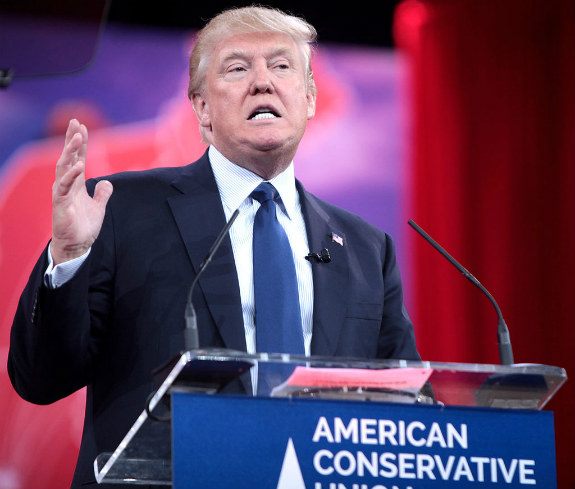
Donald Trump speaks at CPAC 2015 in Washington, D.C. (Photo by Gage Skidmore.)
By Francisco Alvarado
Florida Center for Investigative Reporting
A day after celebrity real estate developer Donald Trump announced his presidential candidacy, the Miami-Dade Commission on Ethics and Public Trust found probable cause that his consultant Ed Russo violated local lobbying regulations in connection with a failed bid to take over the Crandon Park Golf Course from the county. However, the ethics commission dismissed the charge against Russo, as well as two companion complaints against Miami-Dade Mayor Carlos Gimenez and Trump for also breaking lobbying regulations.
According to a summary of the June 17 meeting, Trump expressed an interest in buying Crandon while playing a round of golf with the mayor at the public course last year. Gimenez told Trump the county could not sell him the golf course, but that he could possibly manage it. “Since there was no proposal for which action was being sought at the time of the initial discussion between Trump and Gimenez, the meeting is not considered lobbying, so no probable cause was found on the complaints,” the summary states.
Trump followed up by sending a letter in March 2014 asking Gimenez what the next steps might be. Gimenez delegated the response to his staff members, who advised Trump he could submit an unsolicited proposal. The star of the realty television series, The Apprentice, offered to spend $10 million renovating the Crandon golf course in exchange for a 99-year management deal. He dropped his bid last month when County Commission Chairman Jean Monestime recommended rejecting the deal.
While Trump was putting out his feelers, Russo had subsequent meetings with county officials to seek assistance in preparing the unsolicited proposal, according to the ethics commission meeting summary. “He also appeared before the Crandon Park Master Plan Advisory Committee (CPAC) and met with committee member Bruce Matheson to discuss Trump’s interest,” the summary states. “The ethics commission found probable cause that Russo should have registered before his interactions with CPAC and Matheson.”
Russo told the ethics commission that he is not a lobbyist and was unaware of Miami-Dade’s regulations. When he became aware that he needed to register as a lobbyist, he did so, the summary states.
